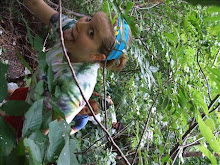That being said, Ecuador is a country of rapid development, from new hydroelectric energy to dozens of housing developments going up right here in the Chillos Valley. It's my fear that as Ecuador continues to develop, its children will move away from their love of the natural world and innate understanding of it's importance to their well-being.
As we began reassessing our progress from last year and re-evaluating our goals for the next 6 months, it became clear to me how important it is to focus on environmental education, along with my agriculture projects. I decided to delve into two bigger goals - exposing children to hands-on science and environmental education outside of the library and helping start a nutrition-based agriculture education program with a local school called Aliñambi. I've set to accomplish the first goal through monthly field trips to various science museums in Quito and nearby natural parks. To read about our first one, please see my entry for our MPI blog. The second goal involves colaborating with Haley and Krysta, two other health-focused PDs, to empower the 6th grade class that we work with to take control over their own nutrition and health. Research has shown that students who participate in class gardening projects tend to make better decisions about their daily diets because they feel connected to what they're growing and have a deeper understanding of where their food comes from.

Fellow PDs Krysta, Erik, Chet, Mike and Sarah helping clear the grass for our garden

Teaching our students at Aliñambi how much fun it is to make recycled paper
Thanks for checking in!
- Jackie



No comments:
Post a Comment